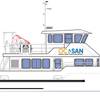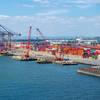Despite a rash of failures at sea and high-profile legal cases regarding illegal dumping, cruise shipping remains one of the safest and environmentally conscious modes of transportation available, according to a recently released report.
The International Council of Cruise Lines cited the General Accounting Office (GAO) Report released to Congress as acknowledgement of the high degree of compliance by the cruise industry with U.S. environmental regulations.
The GAO report, "Fewer Incidents by Cruise Ships Reported, But Important Issues Remain,'' states that, during the period from 1993-1998, the U.S. Coast Guard recorded 2,395 illegal discharges from all non-U.S. vessels, of which only 87 were from passenger ships. According to the report, during that same time period, cruise companies significantly improved waste management and environmental procedures by streamlining waste handling and disposal practices and implementing preventive steps such as recycling, reuse of materials, and waste minimization. Since that reporting period, even more improvements have been made by the industry including unified industry waste management practices and procedures.
"The GAO report is based on a comprehensive review of our industry's environmental compliance,'' said John Bastek, ICCL Acting President, "and represents a balanced evaluation of our environmental record. We recognize the need for improvement in certain areas, but we are proud of an overall record that accounted for only four percent of the pollution incidents on non-U.S. ships. Had the GAO study examined all vessels, this percentage would have been even lower.''
Officials from the U.S. Coast Guard, Department of Justice and the Center for Marine Conservation (CMC), a non-profit organization dedicated to the preservation of marine wildlife and habitats, told the GAO that "the cruise ship industry had made progress'' on environmental compliance. "I am greatly encouraged that GAO has concluded that there has been significant improvement in reducing ocean pollution by the industry,'' said Roger E. McManus, CMC President Emeritus. "This tracks with my experience with the leadership in the cargo and cruise industry for proactively seeking to meet and exceed government standards and strive for excellence in their operations for protecting the environment and human safety. This is clearly on the right course,'' McManus concluded. The study was the result of a six-month analysis of U.S. government data on illegal marine discharges and a review of cruise line company records on environmental policies, practices, and procedures. The participating U.S. government agencies included the U.S. Coast Guard, the U.S. Departments of Justice, State, Agriculture, and Commerce, the Military Sealift Command, and the U.S. Public Health Service.
For a copy of the GAO report, contact the GAO Publications Office at 202-512-6000.
Subscribe for
Maritime Reporter E-News
Maritime Reporter E-News is the maritime industry's largest circulation and most authoritative ENews Service, delivered to your Email five times per week









